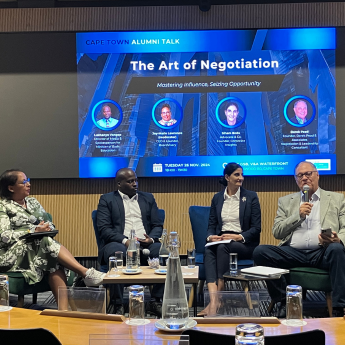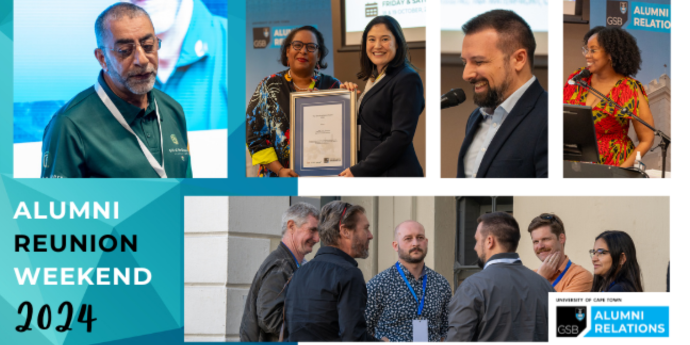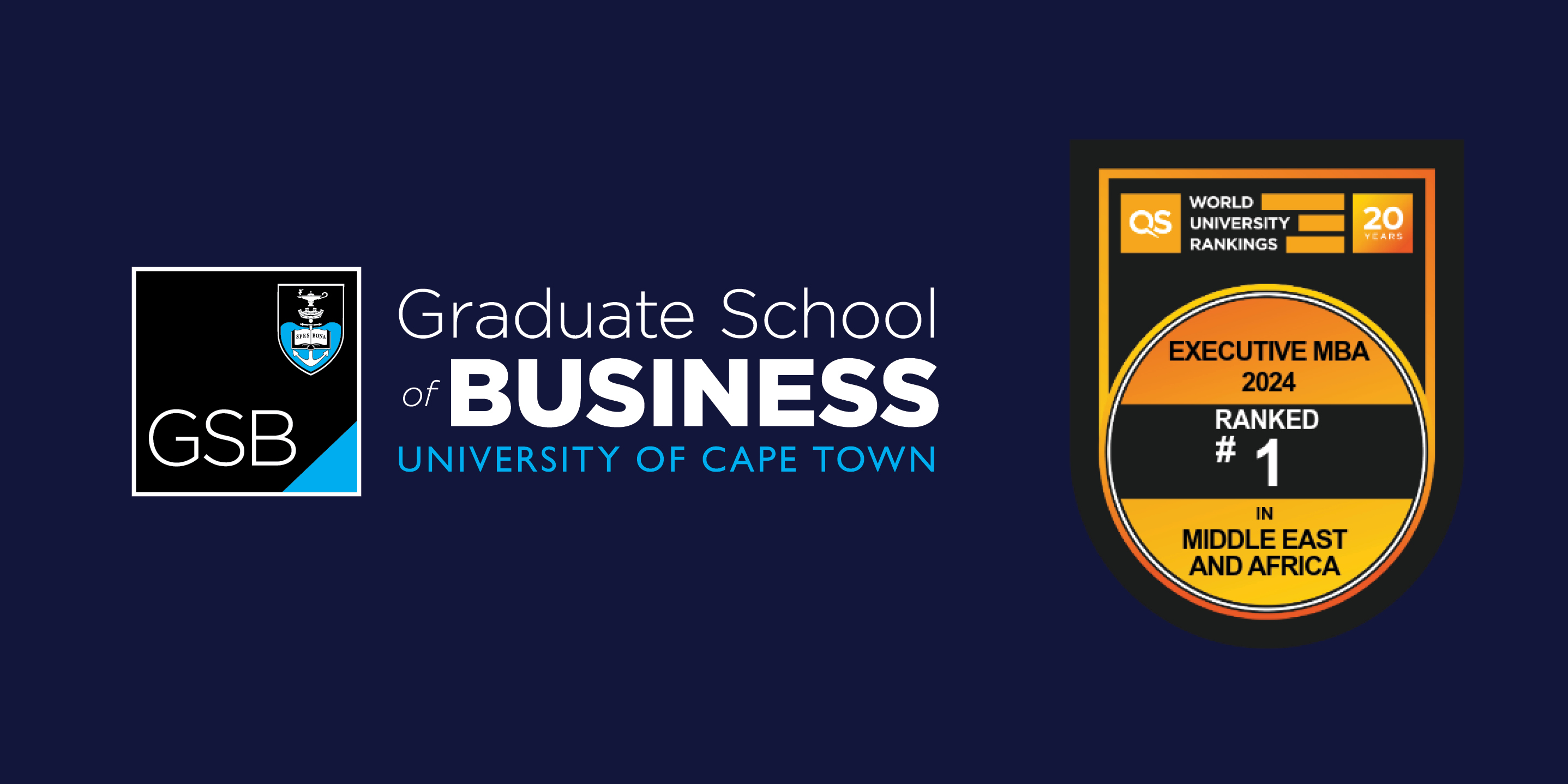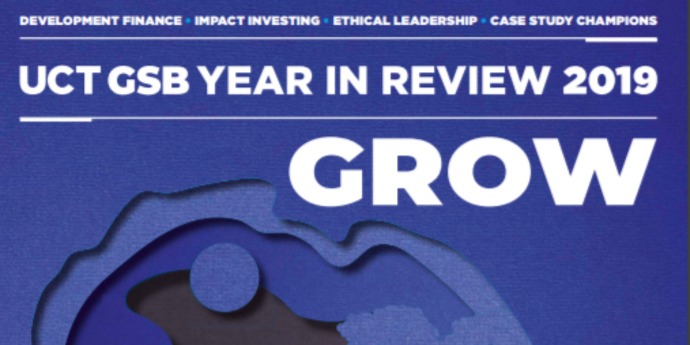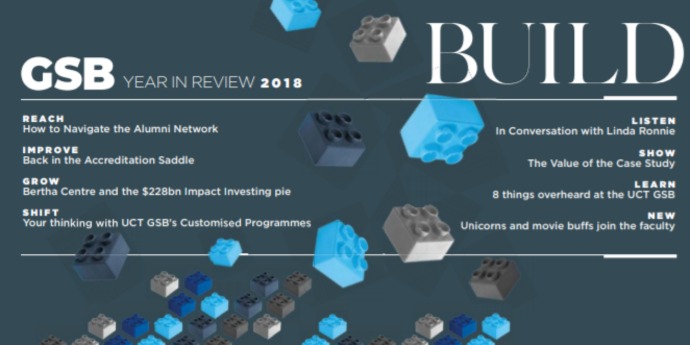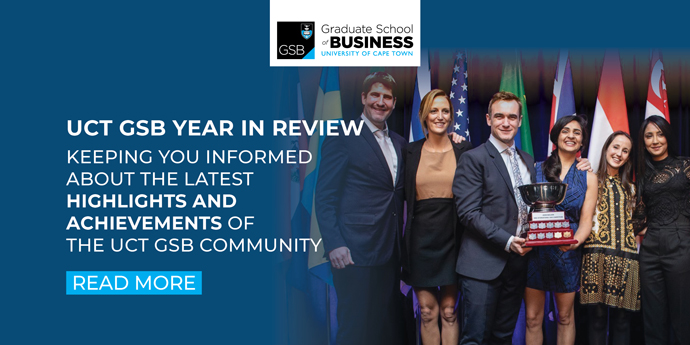The last Alumni Talk of 2024 was an important one for several reasons. Not only was the topic particularly pertinent after a year of seismic political upheaval, but as the UCT GSB prepares to host The Negotiation Challenge for Students– a global contest for the best negotiators from the top universities in the world – the event set the stage for the first TNC finals to be held on the continent.
Two of the three speakers who comprised the panel of The Art of Negotiation Alumni Talk had not only participated in The Negotiation Challenge for Professionals. They had won it. In 2020, mediator and ICT entrepreneur Siham Boda (MBA, 2009) and retired actuary, independent director and professional coach, Derek Pead, entered the professional division of the TNC (the Challenge is divided into Student and Professional categories) and emerged victorious. Both were instrumental in bringing the TNC Finals to the GSB.
They were joined by Lukhano Vangqa (MBA, 2024), Spokesperson for the Minister of Basic Education, and a consummate negotiator who played a pivotal role in mediating the Fees Must Fall protests in 2016, and resolving the public service wage negotiations of June 2018 that had begun nine months prior.
The panel was moderated by lawyer and Boardvisory founder Joy-Marie Lawrence (EMBA, 2010, Cum Laude), who recently won the Director’s Award for Outstanding Service to the GSB. Through Joy-Marie’s deft and incisive prompting, the attending GSB alumni were treated to a feast of insights, anecdotes, perspectives, and sage advice on what is becoming an increasingly rare and valuable phenomenon in our country and, indeed, our world: coming to a mutually acceptable agreement.
A History of Negotiation
“South Africa has a significant history of negotiation,” Lawrence pointed out. “From our founding constitution to trade deals with BRICS countries to chicken imports, there's an essence of negotiation that threads through from politics to business to our everyday lives.”
Whether its deciding on a business strategy or what to have for dinner, negotiations happen all the time. This makes it a vital skill, and is one of the reasons why the UCT GSB offers a negotiation elective course – Negotiating to Create Value – as part of its MBA programme. However, the panel agreed that negotiation should not only be taught at universities, but primary schools too.
“That's something I feel really strongly about,” said Boda, “and I really wish we could see it in curricula from a very young age. If our children could learn how to be assertive and empathetic at the same time in order to achieve what it is they want, we would all be in a much better place. It's something that would empower children and it's something they can and should learn. And that’s a message you can take back to Minister [of Basic Education] Gwarube, Lukhano.”
The minister’s spokesperson, Lukhanyo Vangqa, agreed: “Learning this skill while young could contribute a lot of value to children as they mature into quality citizens of our country. There's a lot that our education curricula could do to assist children in responding to the world that we find ourselves in – and also the world of the future: negotiation, entrepreneurship, personal finance management. There's a lot of opportunity for our curricula to be developed and I think negotiation should be added as well.”
How to be a Clever Cooperator
When asked what the most important skill is for a successful negotiator, the panel showed how complex and layered the subject really is, and how context should shapes one’s approach.
Boda said that active listening is a vital to getting an outcome where both parties can feel understood and treated fairly. “[Negotiations are] often overshadowed by tactics like persuasion or strategy,” she said, “but listening is where the real influence begins. Active listening goes beyond just hearing words. It's about understanding what's beneath them: the needs, the emotions, and the motivations that are driving other parties.
“In my experience, active listening has transformed negotiations from adversarial exchanges to collaborative problem-solving processes. For instance, during workplace mediations, I've seen how clarifying questions and reflecting back what I hear often creates trust and opens the doors to solutions that both sides may not have considered. People feel respected and valued when they know they've been truly heard.”
Vangqa said that the most important skill is somewhat counterintuitive, because truly great negotiators know instinctively how and when to give. “We always go into negotiations knowing what we want to get out of them,” he said. “But I doubt that a lot of us go in knowing what or how much we want to give.”
He cited the example of the Fees Must Fall protests of 2016, where students demanded reforms before writing their exams, which were looming. With negotiations deadlocked at 3am, he approached the student leadership team and pleaded for them to give their commitment to writing the exams, explaining that this would assuage the doubts that the university’s leadership had expressed over the students’ bona fides. The students agreed, and in return they received a raft of favourable outcomes at the time.
Prepare for Success
“I’m not sure if it’s a skill or a task,” said Pead, “but you need to prepare. And you need to prepare thoroughly. Obviously the list of the things that you need to think about grows with the complexity and size of the deal. But you always need to prepare. When people show up at a negotiation unprepared, it comes across as disrespectful, amateurish. That should never happen.
“One of the jobs of a negotiator is not only to get the deal done but to at least maintain, if not improve, the relationship at the time. That's not always easy but that's what we judge a good negotiator on. In fact, half of your score in The Negotiation Challenge depends on the other side's rating of you in terms of how you made them feel – how happy they would be to do business with you again. So building and maintaining relationships is very important.”
Disagreements are inevitable – at home, at our workplaces, and at every level of the social, political, and economic landscapes we inhabit. But if we aren’t able to somehow find a common ground and build from there, these disagreements can fester and evolve into intractable and sometimes violent conflicts.
This is why initiatives like The Negotiation Challenge offer our world a chance to improve – by listening, by giving, and by preparing. The UCT GSB looks forward to providing not just a temporary home but a wholehearted commitment to taking the art and science of negotiation to the next level.

